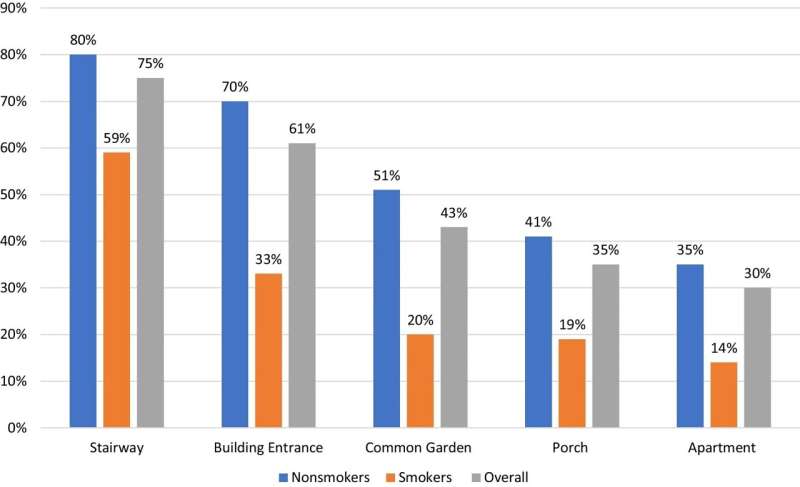This article has been reviewed according to Science X's editorial process and policies. Editors have highlighted the following attributes while ensuring the content's credibility:
fact-checked
trusted source
proofread
Almost half of all Israeli households suffer from second-hand smoke coming in from neighbors' apartments or balconies

A new study from the School of Public Health at the Faculty of Medicine at Tel Aviv University estimates that almost half the Israeli population suffers from second-hand smoke (SHS) penetrating their homes, mostly from smoking neighbors. The study also found that only 1 of 4 families who suffer from smoke infiltrating their homes complain about it to the smoking neighbor, homeowner, or building committee.
The High Court of Justice is now reviewing an appeal against several government ministries for not acting to prevent harmful SHS caused by neighbors who smoke in balconies, houses, yards, or next to windows. According to the researchers, this study is the first in scientific literature to provide evidence about the extent of the problem in Israel, and about the fear of damage to health resulting from SHS infiltration from neighbors' apartments or balconies.
The study was led by Prof. Leah Rosen from the School of Public Health at TAU's Faculty of Medicine, in collaboration with graduate student Noa Theitler from the School of Public Health, Dr. Maya Peled Raz from the University of Haifa, Dr. Michal Bitan from the Academic College of Management, and Dr. Vaughan Rees from the Harvard T.H. Chan School of Public Health.
The paper was published in the Israel Journal of Health Policy Research.
The present study is the third in a series of recently published papers on SHS led by Tel Aviv University researchers. In the first, published about two years ago, children of smoking parents were tested for nicotine traces, and findings indicated that 70% are in fact exposed to passive smoking. The team also looked for traces of nicotine in the hair of children whose parents limited their smoking to the balcony or outdoors. Again, findings were disconcerting: nicotine traces were found in the hair of 60% of these children.
The new study completes the picture, revealing a widespread phenomenon: almost 50% of Israeli families suffer from passive smoking due to smoke infiltrating their homes, especially from their neighbors. Most, however, prefer to 'live with' the hazard rather than complain to the neighbors.
Prof. Rosen says, "The study included nearly 300 participants from across the country. Many reported that they were greatly disturbed by the smoke and feared for their health but preferred not to complain—in order to avoid confrontation and maintain good neighborly relations. Some even reported that they had had to move due to smoke coming in incessantly from their neighbors."
Prof. Rosen adds, "Today Israeli law prohibits smoking at a distance of 10 meters from public places like hospitals and schools, but completely ignores SHS from smoking in balconies or next to windows. This is an absurd situation that leaves the public helpless in face of a constantly growing threat. It must be emphasized that there is no such thing as a safe level of exposure to tobacco smoke."
"Even brief exposure to a small amount can cause great damage, including asthma and heart attacks. Since cigarette smoke can travel up to 9 meters in the open air, it is very likely to infiltrate neighbors' homes in crowded apartment buildings. A single smoker can cause infiltration into as many as 10 neighboring apartments."
Prof. Rosen notes that the Supreme Court of Justice is currently reviewing an appeal filed by the NPO 'Citizens for Clean Air' and six citizens, led by Attorney Amos Hausner, against the Ministries of Environmental Protection, Health, and Internal Security, for their failure to provide protection against SHS infiltrating homes from the outside. The appellants claim that exposure to smoke from their neighbors had greatly damaged their health, and that it is the government's responsibility to resolve the issue.
"Our paper assesses the extent of the problem in Israel, noting that sometimes people are even forced to leave their homes. With nearly half of respondents testifying that they suffer from this problem, this is much more than a local dispute between neighbors. It is a widespread phenomenon that requires government intervention."
"If the Court grants the support requested in the appeal and requires the government to act, millions of Israelis will be protected from the damage of tobacco smoke infiltrating their homes from outside. In addition, consistent with the public health impact of laws around the world limiting smoking, this can be expected to lead to reduced smoking in the population," concludes Prof. Rosen.
More information: Noa Theitler et al, Tobacco smoke incursion into private residences in Israel: a cross-sectional study examining public perceptions of private rights and support for governmental policies, Israel Journal of Health Policy Research (2023). DOI: 10.1186/s13584-023-00573-w




















